|

Winter
1999 (7.4)
Pages
24-25
Famous People:
Then and Now
Mstislav
Rostropovich
Cellist and Conductor
(1927-2007)
Other articles about
Rostropovich
(1) "Rostropovich:
The Home Museum" by Gulnar Aydamirova. (AI 11.2, Summer
2003)
(2) "Rostropovich:
Happy 75th Birthday. World-Famous Cellist Celebrates in Baku."
(AI 10.1, Spring 2002)
(3) "Intellectual
Responsibility. When Silence is Not Golden." Conversations
with Mstislav Rostropovich and Galina Vishnevskaya by Claude
Samuel. (AI 13.2, Summer 2005)
(4) "Rostropovich & Galina: Celebrating Their 50th
Wedding Anniversary" by Betty Blair and Sheyla Heydarova.
(AI 13.2, Summer 2005)
(5) "Rostropovich
Celebrates 70th Jubilee in Baku." (AI 5.2, Summer 1997)
(6) "Philharmonic Reopens: Renovation
of Baku's Prestigious Concert Hall," by Abid Sharifov,
Deputy Prime Minister. (AI 12.2, Summer 2004).
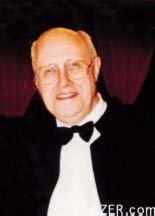  Mstislav Rostropovich
is recognized as one of the greatest cellists of the 20th century.
Born in Baku in 1927, he moved to Moscow with his family in 1931.
His parents, both musicians, recognized his precociousness at
an early age. His mother began teaching him piano at the age
of four, and his father, Leopold, the famous cellist and conductor,
introduced him to the cello shortly thereafter. At the age of
eight, he gave his first major public performance. Mstislav Rostropovich
is recognized as one of the greatest cellists of the 20th century.
Born in Baku in 1927, he moved to Moscow with his family in 1931.
His parents, both musicians, recognized his precociousness at
an early age. His mother began teaching him piano at the age
of four, and his father, Leopold, the famous cellist and conductor,
introduced him to the cello shortly thereafter. At the age of
eight, he gave his first major public performance.
Photo: Mstislav Rostropovich
in Baku, 1997.
At age 16, Rostropovich entered the Moscow Conservatory, where
he studied composition with Prokofiev and Shostakovich. He won
the International Competition for Cellists in Prague (1950) and
in 1956, made a very successful debut at Carnegie Hall in New
York City.
Rostropovich became a teacher (1953) and later professor (1956)
at the Moscow Conservatory and later a professor at the Leningrad
Conservatory (1961). In 1955, he married soprano Galina Vishnevskaya
and often appeared accompanying her at the piano. In 1961, he
began his career as a conductor. He received the coveted Lenin
Prize (1963) and the Gold Medal from the Royal Philharmonic Society
of London (1970).
Despite the high accolades in the Soviet Union, he soon ran into
conflict with authorities in Moscow in 1969 after allowing the
dissident Aleksandr Solzhenitsyn, who had written so much about
Stalin's prison camps in Siberia, to live in his dacha outside
of Moscow.
Rostropovich wrote a letter to Pravda newspaper protesting government
restrictions on cultural freedom. Though his letter was not published,
it was widely disseminated throughout the West, which got him
into trouble at home. The Soviet Ministry of Culture ostracized
him and canceled his tours without explanation, including his
wife's concert at the esteemed Bolshoi Theater in Moscow. Concerts
in foreign countries were canceled as were appearances on radio,
television and recordings.
Finally in 1974 Rostropovich was allowed to go abroad with his
wife and two children. He made what turned out to be a brilliant
debut with the National Symphony Orchestra in Washington, D.C.
(March 5, 1975). They, in turn, invited him to become their Music
Director in 1977.
In the U.S., Rostropovich and his wife spoke out openly against
the Soviet regime. The Moscow authorities retaliated by stripping
him of his Soviet citizenship, which they didn't restore until
1990.
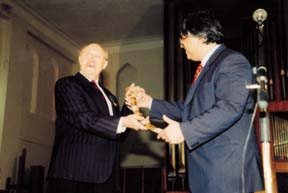  Rostropovich organized
the First Rostropovich International Cello Competition in Paris
in 1981 and the Rostropovich Festival in Snape, England in 1983.
He was honored by the French Legion in 1982 and was knighted
by England's Queen Elizabeth II in 1987. Rostropovich organized
the First Rostropovich International Cello Competition in Paris
in 1981 and the Rostropovich Festival in Snape, England in 1983.
He was honored by the French Legion in 1982 and was knighted
by England's Queen Elizabeth II in 1987.
In 1997, Rostropovich celebrated his 70th Jubilee in Baku. He
was so impressed with the level of musical education there that
he promised to return every year to give Master classes to some
of the young musicians. This is his second year to do so. Rostropovich
now makes his home in Paris and continues giving performances
worldwide.
Photo: Farhad Badalbeyli, Rector of Baku's
Academy of Music, presents Rostropovich with an antique sword,
1998.
Interview
What experiences and interests in childhood would you say shaped
your life and career?
It might
be better if you had the chance to ask my parents that question.
I'm simply the result of their love. What else can I say?
How was your
own childhood different from that of kids growing up today?
You
know, we spent our childhood in what might be called a more romantic
atmosphere. We didn't have computers or calculators. Of course,
we had our own toys, our own dreams and our own fairy tales and
we would impatiently look forward to New Year's parties for children,
which were very common in those days.
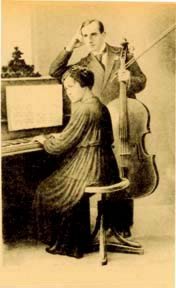  I now have six grandchildren,
and they're interested in computers, calculators and other electronic
apparatus. Before, we didn't have such things. I now have six grandchildren,
and they're interested in computers, calculators and other electronic
apparatus. Before, we didn't have such things.
I also think that we were brought up differently than kids are
today. Don't get me wrong - I'm optimistic about today's youth.
I think that each period of history creates its own mode of life,
which today happens to be in the framework of "progress".
Undoubtedly, it presents considerable disadvantages, primarily
because lifeless computer screens are replacing human relationships.
Our young people sit in front of computers rather than developing
face-to-face relationships. This is one of today's problems.
Photo: Parents of Rostropovich
in Baku,
Leopold and Sophia, around 1930-31. From "Azerbaijan State
Conservatory - 50th Jubilee" (1971).
It's for this reason that I think music, literature and religion
should receive the most emphasis. They are needed to provide
a counterbalance to technical progress.
What advice would you give to young people as they enter the
21st century?
Let them not forget the beauty that God has bestowed upon us
- especially in nature and music. We have a tendency to take
these things for granted and treat them indifferently.
When you give a diamond to a woman, she doesn't throw it away,
right? But we don't value the beautiful nature that has been
given to us by God. That's why I think it's so important to perceive
beauty as emerging, freshly created beauty.
I try not to get used to anything. Every morning when I step
outside my house, I look up at the sky, and it's like I'm seeing
such marvels for the first time. Every day I look at the trees
and think: "What beauty!"
What would you say is your greatest achievement in life? What
do you want to be remembered for most?
I think my greatest achievement is the endless love I have for
people. It gives me great energy. In spite of difficulties in
life, I have never taken revenge against anyone, and I don't
get angry. I would say this is my greatest achievement in life.
[It might be noted that Rostropovich's first name, "Mstislav",
means "avenged glory", but his friends call him simply
"Slava" which means "glory".]
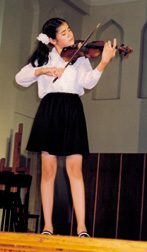 |
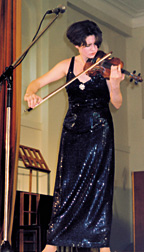 |
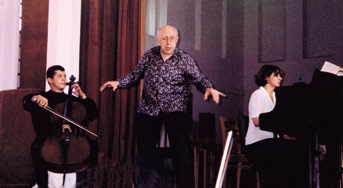
Photos: Rostropovich conducting Master classes
at the Academy of Music in Baku, 1998.
_______
Mstislav Rostropovich was interviewed by Pirouz Khanlou and
Mazahir Panahov at Baku's Academy of Music in November 1999.
From Azerbaijan
International
(7.4) Winter 1999.
© Azerbaijan International 1999. All rights reserved.
Back to Index AI 7.4 (Winter
1999)
AI Home |
Magazine
Choice
| Topics
| Store
| Contact
us
|

